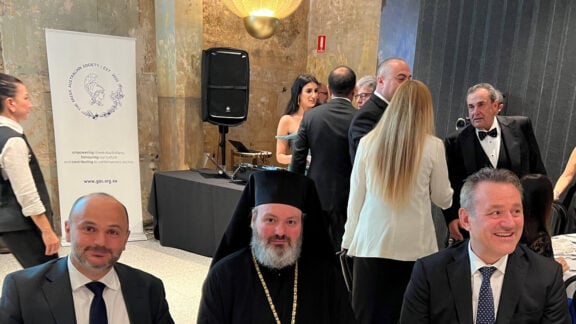The Strategic Plan of the Mitsotakis government for the Greek Diaspora 2024-2027 envisions, among other things, an enhancement of services provided by Consular Authorities to the Diaspora Greeks.
Greece aims to improve the daily lives of Greeks abroad and reduce their “distance” from Greece.
Reports indicate the development of a specialised mobile application that consolidates all provided services into one application, following the gathering of issues concerning the Greek diaspora on gov.gr.
In simple terms, the government desires that various matters related to the Greek diaspora are addressed directly and efficiently through the internet, avoiding time-consuming procedures at consulates.
Strengthening relations with the Greek diaspora is, as expected, among the top priorities of the Ministry of Foreign Affairs for 2024.
More specifically, Foreign Minister George Gerapetritis and Deputy Minister George Kotsiras presented the Strategic Plan for the Greek Diaspora 2024-2027 for approval at the ministerial council that convened on Thursday.
The formulation of the Strategic Plan reflects the importance placed by the Mitsotakis government on the Greek Diaspora and the further empowerment of ties between the metropolitan center and the Greek community abroad.
Thus, a comprehensive and coordinated government policy for the Greek diaspora is primarily shaped through the Strategic Plan, which is structured around six strategic goals:
1. Support and development of networks and structures of the Greek diaspora, emphasising new ways of organisation.
2. Utilisation of the presence of the diaspora element to promote issues of Greek interest.
3. Preservation of elements of Hellenism by strengthening the Greek language, tradition, and culture with an emphasis on the new generation.
4. Maintenance and strengthening of ties with the ecclesiastical institutions of Orthodoxy as a cohesive factor between the metropolitan center and the diaspora.
5. Enhancement of bilateral and multilateral collaborations in the field of the diaspora.
6. Upgrading of services provided by Consular Authorities/improvement of daily life.
Empowering the Greek Diaspora
The organised and two-tiered “mapping” of the Greek diaspora, aiming at enhancing connections with Greece and strategically promoting Greek interests beyond borders, stands as a central initiative in the upcoming “long-term strategic plan” for Greeks abroad.
This awaits approval from the upcoming Ministerial Council, intending to be promptly posted on a consultation platform, engaging with the Greek Diaspora.
According to the plan, the creation of a special platform to record the activities of diaspora organisations and the compilation of a list of prominent expatriates have been finalised.
This move is pivotal for the government’s efforts to obtain accurate information about the activities of Greeks abroad and leverage stronger Greek lobbying in crucial positions and country claims.
Simultaneously, another survey will be conducted (as part of the pilot program “digital transformation of consular services processes”) involving every Greek living and operating abroad.
Everyone will be invited to voluntarily provide their contact information through a special form when digitally served by consular authorities.
Prime Minister Mitsotakis has previously emphasised the need to strengthen the footprint of Greeks abroad, characterising them as “ambassadors of the motherland in the countries where they reside” and “bridges of communication with their peoples.”
The four-year strategic plan (2024-2027) will be presented promptly by the government as the next step after the establishment of the postal vote for the European elections and the removal of any obstacles to the exercise of the voting rights of Greeks abroad from their place of residence.
According to information, Minister George Gerapetritis and Deputy Minister George Kotsiras will present at the Maximos Mansion a “roadmap” with goals and indicative actions on five main axes: daily life (facilitation through digital services, etc.), Greek language education (utilising artificial intelligence in new interactive tools), culture (strengthening bilateral and multilateral collaborations), education (focusing on brain drain), and Orthodoxy (strengthening ties with Orthodox institutions).
Reducing the distance
Regarding the first axis, which focuses on improving the daily lives of Greeks abroad and reducing their “distance” from Greece, information indicates that the creation of a special mobile application is underway.
This application will consolidate all provided services, continuing the gathering of issues related to the Greek diaspora on gov.gr.
Strengthening relations with the Greek diaspora is, in any case, one of the main goals of the Ministry of Foreign Affairs for 2024. A separate focus in this strategy is the enhancement of learning the Greek language through modern methods and digital tools.
In this context, the “staellinika” platform is being enriched. Launched in the fall of 2020, it provides free material for individual users and schools.
Last week, the digital educational tool became available for French and German speakers, expanding its functionality to a total of five languages, including English, Spanish, and Portuguese. Simultaneously, negotiations are reportedly taking place with all Greek embassies for the more organised promotion of events beyond borders for the International Day of the Greek Language (February 9).
Now, citizens can inquire about anything related to Greece online and in English. The presentation of the multilingual digital assistant took place at the Ministry of Foreign Affairs by the Minister of Digital Governance, Dimitris Papastergiou, and the Minister of Foreign Affairs, Giorgos Gerapetritis.
Mr Papastergiou, noted: “mΑigov has conducted, so far, more than 300,000 dialogues, and we are very pleased because at the Ministry of Digital Governance, we are progressing dynamically, pioneering at the European level, and contributing to the vision of Prime Minister Kyriakos Mitsotakis for an outward-looking and friendly country.”
“What do I need for a residence permit in Greece? How can I travel with my pet? How can I open a business in Greece?” These are some of the questions that EU citizens can direct to “mAigov,” the digital assistant on gov.gr, which can provide answers and guidance in 25 languages (24 EU-certified languages and Albanian).
Specifically, citizens from around the world now have the opportunity to “converse” with the “Digital Assistant” in the 24 official languages of the European Union and in Albanian.
Mr Papastergiou added that “it is very important for the Greek diaspora, for people who want to learn about Greece, to do business in Greece, and are looking for a first way in.”
He also explained that in addition to the 25 languages, mAigov speaks other languages such as Chinese or Arabic. As the minister pointed out, the Digital Assistant is a “new passport for all other countries,” “it is an excellent start to show, with the possibility of multilingual interaction of gov, the significant work that has been done in Greece in recent years,” “it is a very good opportunity to go out and show that it is a new Greece that is going better every day.”
He further noted that the digital assistant is planned to respond vocally in any language it is asked.
Note: The search for the “Digital Assistant” mAigov is carried out in the -until today- 1,670 services of gov.gr and the 3,296 administrative procedures of the National Registry of Administrative Procedures “MITOS.”
The model is computational and responds based on the entered data. It takes into account the initial question and retains in its memory the conversation during the session, ensuring the optimal experience for each user. The languages the digital dialogues take place in are English, Bulgarian, French, German, Danish, Greek, Estonian, Irish, Spanish, Italian, Croatian, Latvian, Lithuanian, Maltese, Dutch, Hungarian, Polish, Portuguese, Romanian, Slovak, Slovenian, Swedish, Czech, Finnish as well as in Albanian.









